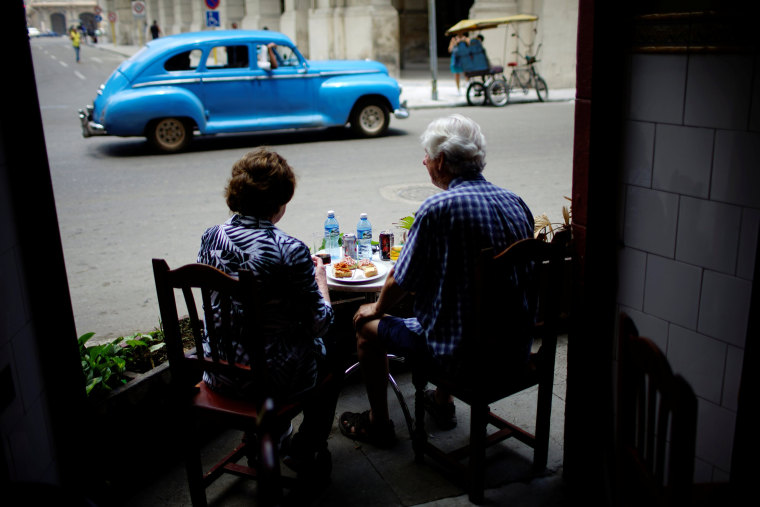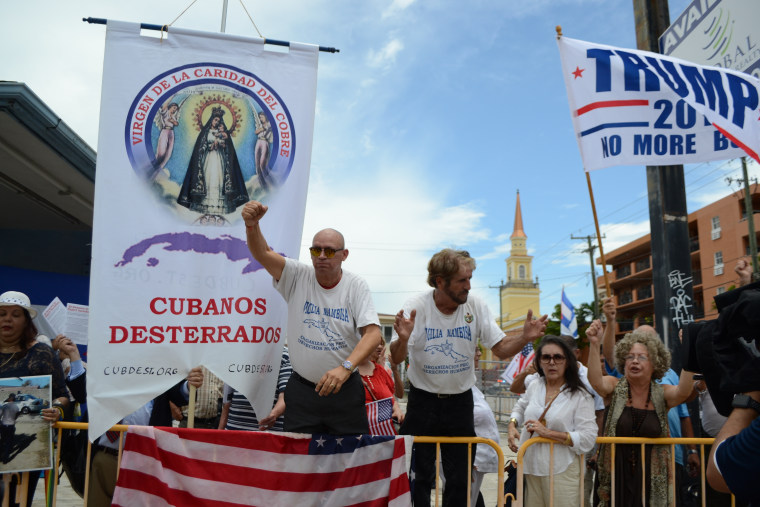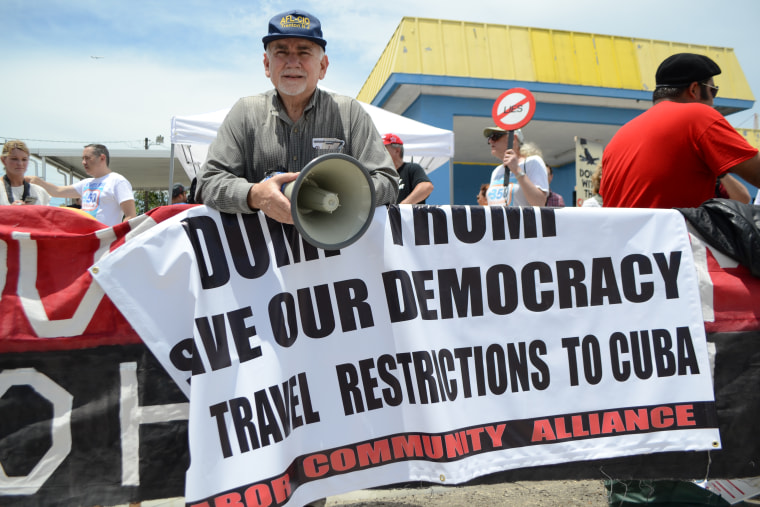WASHINGTON — A two-time veteran of travel to Cuba, librarian AJ Johnson lamented Friday that his plan to return to the island next year with his wife and children is unlikely, now that President Donald Trump retightened restrictions on Americans’ visits there.
Johnson, a librarian for Caribbean studies with the University of Texas at Austin Benson Latin American Collections, was eager for his children to see "how people live in a different place and [to] teach them about the world." He figured when he returned next year, they’d vacation while he worked.
Even though Trump didn't bulldoze former President Barack Obama’s historic renewal of U.S.-Cuba relations, he did close an avenue that Americans were beginning to use to do their own exploring of their Caribbean neighbor.
Trump’s changes include eliminating the individual “people-to-people” category under which Americans could go to Cuba without booking a trip with a group or without pre-arranged travel agendas.
Related: Trump Announces Changes to 'One-Sided' Obama Cuba Policy
"I was there when they announced that Obama was going to visit," Johnson told NBC Latino about his Cuba travel. "The country erupted. Everywhere I went, every single group of people, I could hear them talking about Obama coming. There were parties in the streets ... I know the people of Cuba are so excited about opening up and the possibility of Americans coming."
Johnson also was Cuba in 2000 on a scripted trip for work, going from place to place on a bus and touring locations picked for the group. He only managed an off-script look at Cuba when he snuck away from the trip’s organized Communist block party.
Johnson recalled that on the first trip food was spare, but last year, food carts were abundant, Airbnb lodgings and private restaurants were available. Johnson also indulged his passion for birding, connecting with a driver who knew birding locations, and driving around the island with him.
"Last year when I went I was cien por ciento (100 percent) on my own," Johnson said.

Despite promises to wholly reverse Obama’s Cuba initiative, Trump's alterations were limited.
Gustavo Arnavat, who helped the administration rewrite the U.S.-Cuba relationship, said the limited changes confirm "President Obama’s determination that engagement [with Cuba] is the right thing to do and is in the best interest of Americans’ national security and economic interests."
Arnavat, a former director for the U.S. Interamerican Development Bank and a senior adviser at the Center for Strategic and International Studies, said the change could have an effect on air travel and reduce demand for goods and services provided by Cubans in the emerging private sector, such as rooms in private homes, known as casas particulares, and private retaurants known as paladares.
"But the good news is that it appears that the regulations with respect to family travel will not be affected, so we are not going back to the bad days under the Bush administration, when you could travel once every three years to visit immediate relatives. I think Cubans should be breathing a sight of relief," Arnavat said.
While Cuban Americans once were stalwart in their support of the U.S. policy of isolation of Cuba, they now are much more polarized over liberalizing relations with Cuba, evidenced Friday by reaction of people paying close attention to Trump’s announcement at Miami’s Manuel Artime Theater, named after a veteran of the invasion of the Bay of Pigs, a 1961 U.S. attempt to overthrow Cuba’s Castro government.
A group of relatives, including a mother and her two teenage daughters, who support Trump, welcomed his backing up on openness with Cuba.
"A slight reversal is a great accomplishment," Rosamelia Gonzalez said. Her father’s cousins were imprisoned and executed in Cuba. When her 33 year-old nephew in Cuba passed away from cancer in February, she made the tough decision not to go.
"It’s a difficult choice to make,” she said. Gonzalez and others believe that travel to Cuba helps financially support and perpetuate the communist government.
"Any American citizen that travels to Cuba is funding the government's terrorism against its own citizens," her 14-year-old daughter, Grethel Aguila, said.

Lorenzo Cañizares, a member of the Labor Community Alliance, which helped organize an anti-Trump protest at the theater, fled Cuba in 1962.
He supported the U.S. embargo until the 1980s when he had a change of heart. "This process cannot be done with hate," he said.
He tried to travel to Cuba in 2003 as part of the group Cuban Committee for Democracy, but the Cuban government denied him and two others visas, he said. Still, he wants rapprochement with Cuba. "We don’t want to return to the past," he said.
The change does not mean all travel will be restricted. There are plenty of travel companies that offer trips and there are other categories that Americans can use, if they qualify, for authorized travel to Cuba, such as family, business, journalistic activity, professional research and others.
But Trump's slight retreat from warmer relations with Cuba will also mean that people who can travel there will go through more rigorous regulation to verify they are eligible to travel under the categories allowed, said Pedro Freyre, chair of international practice for Akerman LLP. Freyre represents U.S. companies that do business with Cuba.

"It's a chilling effect and then this sort of drives a downward spiral and that helps make the argument in the future that no one is going and you can impose more restrictions because no one is going," Freyre said.
Icess Fernandez Rojas, a writer and an assistant professor of English at Lone Star College-Kingwood in Houston, Texas, had just begun planning a trip with a friend to Cuba that they were going to take on their own. Fernandez has family on the island and planned to do some freelance writing from there, while her friend planned to do some travel blogging.
"I'm literally here waiting to see what’s happening," she said before Trump’s plans for Cuba policies became official. In the end, she and her friend decided they would still make the trip and travel under the journalists category.
Patrick Hidalgo, a former Obama administration official who helped organize Friday's protest against Trump's Cuba announcement, was relieved the administration didn't touch remittances, money Cuban Americans send back to families on the island, as well as other things loosened under Obama.
Hidalgo said Sen. Marco Rubio and the "powers that be have taken note that our community will not tolerate these guys trading things like health care and the Russia investigation for a hardline Cuba policy," he said.
NBC News contributor Carmen Sesin reported from Miami.

